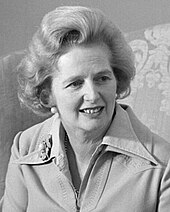Britain Awake

"Britain Awake" (also known as the Iron Lady speech)
The speech was reported on in the
Background
Thatcher had been a
In September 1975, Thatcher carried out a tour of the United States and Canada, meeting with senior figures such as UN secretary-general
Thatcher's appearances in this period were managed by her public relations adviser Gordon Reece.[4] On 19 January 1976 she was due to make a speech at Kensington Town Hall in London, one of her first major speeches as party leader.[6]
Speech
Thatcher made the speech on the evening of 19 January 1976. The address had been written beforehand, and a copy given to the press with an embargo of 8 pm. A comparison between the press release and the speech as made reveals few differences, and those of a mainly stylistic nature.[8]
Thatcher opened the speech by stating that the first duty of any government was to defend its people from external threats and asked rhetorically if the
Thatcher stated that as the Soviet Union had failed in economic and human terms, its only recourse to become a superpower was military means. She stated that she had warned the world before Helskini that the USSR was outspending the US in

Thatcher criticised détente as providing only an illusion of safety and noted that it had not prevented Soviet intervention in the
Thatcher warned that all
Thatcher noted that Britain's reputation abroad had declined, stating that "as I travel the world, I find people asking again and again, 'What has happened to Britain?' They want to know why we are hiding our heads in the sand, why with all our experience, we are not giving a lead". She warned that the Soviet-backed

Thatcher committed her party to follow a foreign policy closely aligned with the US and called for closer ties with European states and the
Thatcher referred to Britain's position in the
Thatcher concluded her speech by stating that the Conservatives believed Britain was a great country and had the "vital task of shaking the British public out of a long sleep". Her closing sentences were: "There are moments in our history when we have to make a fundamental choice. This is one such moment – a moment when our choice will determine the life or death of our kind of society, – and the future of our children. Let's ensure that our children will have cause to rejoice that we did not forsake their freedom".[8] Part of the speech was broadcast on BBC Radio at 10 pm that night.[8]
Impact
In his biography of Thatcher,
The
Reuters Russian reporter Robert Evans wrote a story on the Soviet press coverage, including Gavrilov's use of the term "Iron Lady", picked up on by Western media outlets. The British press quickly adopted the term and used it as a descriptor of her tough
Thatcher later became prime minister of the United Kingdom after winning a decisive victory in the
References
- ^ a b c d Gardiner & Thompson 2013, p. 10.
- ^ a b Margaret Thatcher at the Encyclopædia Britannica. Retrieved 7 May 2021.
- ^ a b c Byrd 1988, p. 60.
- ^ a b "Margaret Thatcher at the National Press Club, September 19, 1975" (PDF). Library of Congress. Retrieved 8 May 2021.
- ^ "Speech to the National Press Club". Margaret Thatcher Foundation. 19 September 1975. Retrieved 8 May 2021.
- ^ a b Campbell 2008, p. 419.
- ^ Kensington Town Hall on the High Street, 1905. Royal Borough of Kensington and Chelsea. Retrieved 8 May 2021.[dead link]
- ^ a b c d e f g h i j k l m n "Speech at Kensington Town Hall ("Britain Awake") (The Iron Lady)". Margaret Thatcher Foundation. 19 January 1976. Retrieved 13 May 2021.
- S2CID 55410556.
- ^ Gardiner & Thompson 2013, p. 11.
- ^ "London Hilton bombing: anatomy of the 1975 IRA attack". The Week UK. 4 September 2015. Retrieved 9 May 2021.
- ^ a b c Fisher, Max (8 April 2013). "'Irony Lady': How a Moscow propagandist gave Margaret Thatcher her famous nickname". The Washington Post. Retrieved 7 May 2021.
- ^ Miller Center Journal 1995, p. 146.
- ^ Gardiner & Thompson 2013, p. 12.
- ^ "Speech to Finchley Conservatives (admits to being an "Iron Lady")". Margaret Thatcher Foundation. 31 January 1976. Retrieved 10 May 2021.
Works cited
- Byrd, Peter (1988). British Foreign Policy Under Thatcher. Philip Allan. ISBN 978-0-86003-701-9.
- ISBN 978-0-09-951677-4.
- ISBN 978-1-62157-179-7.
- Miller Center Journal. Vol. 2. 1995.

